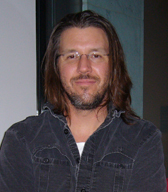David Foster Wallace Berühmte Zitate
This Is Water: Some Thoughts, Delivered on a Significant Occasion, about Living a Compassionate Life
Unendlicher Spaß, Kiepenheuer & Witsch, Köln 2009, ISBN 978-3462-04112-5, Seite 1237; Übersetzer: Ulrich Blumenbach
David Foster Wallace Zitate und Sprüche
„Dass es perverserweise oft mehr Spaß macht, etwas zu wollen, als es zu haben.“
Unendlicher Spaß, Kiepenheuer & Witsch, Köln 2009, ISBN 978-3462-04112-5, Seite 295; Übersetzer: Ulrich Blumenbach
Original engl.: "That, perversely, it is often more fun to want something than to have it."
David Foster Wallace: Zitate auf Englisch
Quelle: This Is Water: Some Thoughts, Delivered on a Significant Occasion, about Living a Compassionate Life
“My chest bumps like a dryer with shoes in it.”
Quelle: Infinite Jest (1996)
“I cannot say what color Lenore Beadsman’s eyes are; I cannot look at them; they are the sun to me.”
Quelle: The Broom of the System
“So yo then man what's your story?”
Quelle: Infinite Jest
“She wanted only tall smooth bottles whose labels spoke of Proof.”
Quelle: Infinite Jest
“Be on guard. The road widens, and many of the detours are seductive.”
Quelle: Infinite Jest
Quelle: The Best American Essays 2007
“They can kill you, but the legalities of eating you are quite a bit dicier.”
Quelle: Infinite Jest (1996)
“She was terrified of everything, and terrified to show it.”
Quelle: Brief Interviews with Hideous Men
“… perversely, it is often more fun to want something than to have it.”
Quelle: Infinite Jest
Quelle: This Is Water: Some Thoughts, Delivered on a Significant Occasion, about Living a Compassionate Life
“… the sun would leave my sky if I couldn't assume you'd simply come and tell me you were sad.”
Quelle: Infinite Jest
Quelle: This Is Water: Some Thoughts, Delivered on a Significant Occasion, about Living a Compassionate Life
E Unibus Pluram: Television and U.S. Fiction
Essays
Quelle: A Supposedly Fun Thing I'll Never Do Again: Essays and Arguments
Kontext: The emergence of something called Metafiction in the American '60s was hailed by academic critics as a radical aesthetic, a whole new literary form, literature unshackled from the cultural cinctures of mimetic narrative and free to plunge into reflexivity and self-conscious meditations on aboutness. Radical it may have been, but thinking that postmodern Metafiction evolved unconscious of prior changes in readerly taste is about as innocent as thinking that all those college students we saw on television protesting the Vietnam war were protesting only because they hated the Vietnam war (They may have hated the war, but they also wanted to be seen protesting on television. TV was where they'd seen the war, after all. Why wouldn't they go about hating it on the very medium that made their hate possible?) Metafictionists may have had aesthetic theories out the bazoo, but they were also sentient citizens of a community that was exchanging an old idea of itself as a nation of do-ers and be-ers for a new vision of the U. S. A. as an atomized mass of self-conscious watchers and appearers. For Metafiction, in its ascendant and most important phases, was really nothing more than a single-order expansion of its own theoritcal nemesis, Realism: if Realism called it like it saw it, Metafiction simply called it as it saw itself seeing it. This high-cultural postmodern genre, in other words, was deeply informed by the emergence of television and the metastasis of self-conscious watching.
Federer as Religious Experience, New York Times, August 20, 2006
Essays
